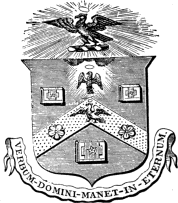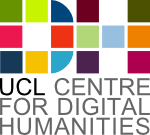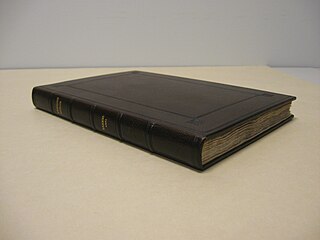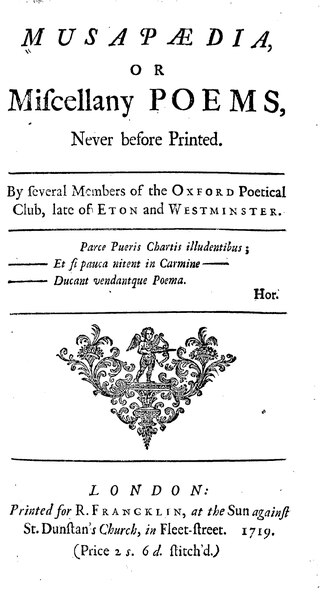Related Research Articles

The codex was the historical ancestor of the modern book. Instead of being composed of sheets of paper, it used sheets of vellum, papyrus, or other materials. The term codex is often used for ancient manuscript books, with handwritten contents. A codex is bound by stacking the pages and securing one set of edges, in a form analogous to modern bookbinding. Modern books are divided into paperback and those bound with stiff boards, called hardbacks. Elaborate historical bindings are called treasure bindings. At least in the Western world, the main alternative to the paged codex format for a long document was the continuous scroll, which was the dominant form of document in the ancient world. Some codices are continuously folded like a concertina, in particular the Maya codices and Aztec codices, which are actually long sheets of paper or animal skin folded into pages. In Japan, concertina-style codices called orihon developed during the Heian period (794–1185) were made of paper.

John Lyly was an English writer, playwright, courtier, and parliamentarian. He was best known during his lifetime for his two books Euphues: The Anatomy of Wit (1578) and its sequel Euphues and His England (1580), but is perhaps best remembered now for his eight surviving plays, at least six of which were performed before Queen Elizabeth I. Lyly's distinctive and much imitated literary style, named after the title character of his two books, is known as euphuism. He is sometimes grouped with other professional dramatists of the 1580s and 1590s like Christopher Marlowe, Robert Greene, Thomas Nashe, George Peele, and Thomas Lodge, as one of the so-called University Wits. He has been credited by some scholars with writing the first English novel, and as being 'the father of English comedy'.

The Worshipful Company of Stationers and Newspaper Makers, usually known as the Stationers' Company, is one of the livery companies of the City of London. The Stationers' Company was formed in 1403; it received a Royal Charter in 1557. It held a monopoly over the publishing industry and was officially responsible for setting and enforcing regulations until the enactment of the Statute of Anne, also known as the Copyright Act of 1710. Once the company received its charter, "the company's role was to regulate and discipline the industry, define proper conduct and maintain its own corporate privileges."

Paul Alexander Slack FBA is a British historian. He is a former principal of Linacre College, Oxford, pro-vice-chancellor of the University of Oxford, and professor of early modern social history in the University of Oxford.

Humfrey Wanley was an English librarian, palaeographer and scholar of Old English, employed by manuscript collectors such as Robert and Edward Harley. He was the first keeper of the Harleian Library, now the Harleian Collection.
The Institute of English Studies is a centre of excellence in the research, promotion and facilitation in the field English Literature and Language. With a specialisation in book history, palaeography and textual scholarship, the IES facilitates the advanced study and research of English Studies in the national and international academic community. The institute, located in Senate House, London, is one of the nine institutes that together comprise the School of Advanced Study, University of London.

The UCL Centre for Digital Humanities is a cross-faculty research centre of University College London. It brings together digital humanities work being done in many of the university's different departments and centres, including the library services, museums and collections. The Centre counts among the "most visible" in the field and facilitates various opportunities for study at post-graduate level, including the MA/MSc in Digital Humanities, doctoral study, and short courses as part of the Department of Information Studies.

Drexel 4041 is a 17th-century British music manuscript commonplace book. As described by musicologist John P. Cutts, Drexel 4041 "is a treasure-house of early seventeenth-century song and dramatic lyric worthy of the attention of any student of seventeenth-century literature and drama." It is also a major source for the work of English composer William Lawes. Belonging to the New York Public Library, it forms part of the Drexel Collection, housed in the Music Division of the New York Public Library for the Performing Arts. Following traditional library practice, its name is derived from its call number.

A miscellany is a collection of various pieces of writing by different authors. Meaning a mixture, medley, or assortment, a miscellany can include pieces on many subjects and in a variety of different forms. In contrast to anthologies, whose aim is to give a selective and canonical view of literature, miscellanies were produced for the entertainment of a contemporary audience and so instead emphasise collectiveness and popularity. Laura Mandell and Rita Raley state:
This last distinction is quite often visible in the basic categorical differences between anthologies on the one hand, and all other types of collections on the other, for it is in the one that we read poems of excellence, the "best of English poetry," and it is in the other that we read poems of interest. Out of the differences between a principle of selection and a principle of collection, then, comes a difference in aesthetic value, which is precisely what is at issue in the debates over the "proper" material for inclusion into the canon.
Steven W. May is an American academic and author specializing in English Renaissance poetry.

Drexel 5611 is a 17th-century music manuscript compilation of works written for virginal. Dating from either the end of the Commonwealth period or the early Restoration period, it is an important source for English keyboard music. It also includes a handful of works by French composers, reflecting the growing interest among English musicians in contemporary French keyboard music.
The Lyell Readership in Bibliography is an endowed annual lecture series given at the University of Oxford. Instituted in 1952 by a bequest from the solicitor, book collector and bibliographer, James Patrick Ronaldson Lyell. After Lyell's death, Keeper of the Western Manuscripts at the Bodleian Library, Richard William Hunt, writing of the Lyell bequest noted, "he was a self-taught bibliophile and scholar of extraordinary enthusiasm and discrimination, and one who deserves to be remembered not only by Oxford but by the whole bibliographical world."
Anne Southwell [née Harris], later called Anne, Lady Southwell, was a poet. Her commonplace book includes a variety of works including political poems, sonnets, occasional verse, and letters to friends.

Books in the United Kingdom have been studied from a variety of cultural, economic, political, and social angles since the formation of the Bibliographical Society in 1892 and since the History of books became an acknowledged academic discipline in the 1980s. Books are understood as "written or printed work consisting of pages glued or sewn together along one side and bound in covers".

Drexel 3976, also known as The Rare Theatrical, is a 17th-century music manuscript compilation of works by the composer Matthew Locke, considered by some to be "the father of all Restoration dramatic music." The manuscript is a significant source of Locke's instrumental dramatic music with many works not known through any other source, although the contexts of the individual works and the names of the plays which they are from has not been documented.
Sir James Runcieman Sutherland, FBA was an English literary scholar, Lord Northcliffe Professor of Modern Literature at London University.
George Thorn-Drury KC (1860–1931) was an English barrister and literary scholar.
Katherine Ross born Katherine Collace was a Scottish Covenanter, memoirist and schoolmistress.
Oxford, Bodleian Library, MS Fairfax 16, also known as the Fairfax Manuscript, is a fifteenth-century Middle English poetic anthology which contains one of the finest collections of Chaucerian verse of this period. Owned and commissioned by John Stanley of Hooton, Cheshire, Fairfax 16 was produced in Oxford or London in the mid-fifteenth century. Thomas Fairfax bequeathed it to the Bodleian Library in 1671.

The Shirburn Ballads is the name given to an early 17th-century manuscript collection of Elizabethan to early Stuart-era ballads that formerly resided in the collection of the Earls of Macclesfield in the library at Shirburn Castle. As per the Ballad Index compiled by W.B. Olsen, it is one of a number of significant sources for ballads of that period. According to the relevant entry in the Catalogue of English Literary Manuscripts 1450–1700, the main scribe may have been Edwarde Hull, whose name appears on leaf 155. It is believed that since the current set of leaves is numbered from 98 onwards, a further initial 97 leaves were once present but were lost prior to the set's binding in 1860. The collection is mainly known to scholars via an edited version that was published by the Reverend Andrew Clark in 1907. Most or all of the included ballads derive from broadside ballad sources which were recorded as published for copyright purposes in relevant 16th-century sources, and include a subset for which the original broadside copy has not survived. Since 2007, the original work is now in the collection of the British Library.
References
- ↑ Dedicated to the memory of Peter George Beal Leverton Sons, Ltd.
- 1 2 "Beal, Peter George", Who's Who (online ed., Oxford University Press, 2023). Retrieved 29 January 2024.
- ↑ Beal, Peter, P. J Croft, Theodore Hofmann, and John Horden. 1980. Index of English Literary Manuscripts. London, New York: Mansell ; Bowker.
- ↑ H. R. Woudhysen, "CELM: Summary and reflections on London seminar #3", UCL Centre for Digital Humanities, 6 December 2010. Retrieved 29 January 2024.
- ↑ "CELM at the Folger."Catalogue of English Literary Manuscripts 1450–1700.
- 1 2 "Dr Peter Beal FBA", British Academy . Retrieved 29 January 2024.
- 1 2 A Dictionary of English Manuscript Terminology 1450–2000", Oxford Reference. Retrieved 29 January 2024.
- ↑ Beal, Peter, and Oxford University Press. 1998. In Praise of Scribes : Manuscripts and Their Makers in Seventeenth-Century England. Oxford, New York: Clarendon Press ; Oxford University Press.
- ↑ "In Praise of Manuscripts," The Book Collector 49 (no.3) (Autumn 2000): 328-348.
- ↑ S. P. Cerasano. and Steven W. May., eds. In the Prayse of Writing Early Modern Manuscript Studies : Essays in Honour of Peter Beal. 2012 1. publ ed. London: British Library.
- ↑ Gibson J. review of In the Prayse of Writing: Early Modern Manuscript Studies: Essays in Honour of Peter Beal.Renaissance Quarterly. 2013;66(4):1476-1477.